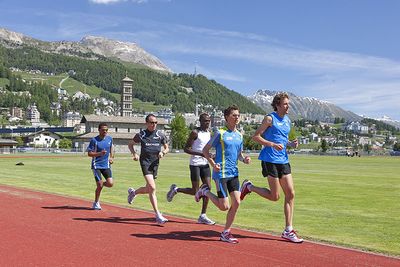Difference between revisions of "Altitude Training"
From Fellrnr.com, Running tips
User:Fellrnr (User talk:Fellrnr | contribs) |
User:Fellrnr (User talk:Fellrnr | contribs) |
||
| Line 1: | Line 1: | ||
[[File:AltitudeTraining.jpg|right|thumb|400px|Altitude training in the Swiss Olympic Training Base in the Alps]] | [[File:AltitudeTraining.jpg|right|thumb|400px|Altitude training in the Swiss Olympic Training Base in the Alps]] | ||
| − | Training at high altitude has been shown to improve endurance. And high-altitude there is less oxygen available, and this forces adaptations such as increased red blood count and improved muscle metabolism that help with endurance both at altitude and at sea level. Initial [[Altitude Training Approaches]] involved living at a high altitude location for some time, and this approach is still used by many of the athletes. However, this is expensive and impractical for many people, so various altitude simulation approaches have been developed. Most of these approaches reduce the oxygen content of normal pressure air at low altitude. | + | Training at high altitude has been shown to improve endurance. And high-altitude there is less oxygen available, and this forces adaptations such as increased red blood count and improved [[Muscle|muscle]] metabolism that help with endurance both at altitude and at sea level. Initial [[Altitude Training Approaches]] involved living at a high altitude location for some time, and this approach is still used by many of the athletes. However, this is expensive and impractical for many people, so various altitude simulation approaches have been developed. Most of these approaches reduce the oxygen content of normal pressure air at low altitude. |
==See Also== | ==See Also== | ||
* [[Altitude Training Approaches]] | * [[Altitude Training Approaches]] | ||
Revision as of 16:11, 15 April 2013
Training at high altitude has been shown to improve endurance. And high-altitude there is less oxygen available, and this forces adaptations such as increased red blood count and improved muscle metabolism that help with endurance both at altitude and at sea level. Initial Altitude Training Approaches involved living at a high altitude location for some time, and this approach is still used by many of the athletes. However, this is expensive and impractical for many people, so various altitude simulation approaches have been developed. Most of these approaches reduce the oxygen content of normal pressure air at low altitude.
See Also
- Altitude Training Approaches
- Comparison of Altitude Training Systems
- AltoLab
- The Science of Altitude Training
- Book Review of Altitude Training and Athletic Performance
- Intermittent Hypoxic Exposure and The Science of Intermittent Hypoxic Exposure
- Chronic Mountain Sickness
- Viagra, Exercise and Altitude
